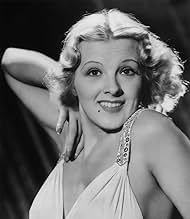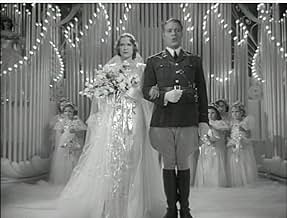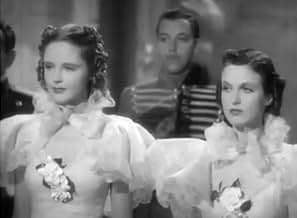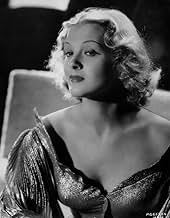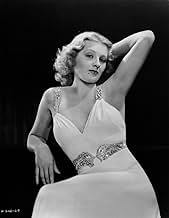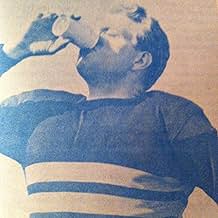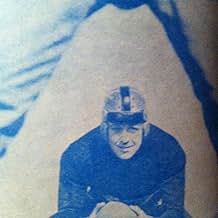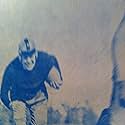West Point cadet Dick Thorpe falls in love with a girl, who turns out to be a princess from an European kingdom.West Point cadet Dick Thorpe falls in love with a girl, who turns out to be a princess from an European kingdom.West Point cadet Dick Thorpe falls in love with a girl, who turns out to be a princess from an European kingdom.
- Director
- Writers
- Stars
- Awards
- 1 win total
Carol Adams
- Dancer
- (uncredited)
Kay Aldridge
- Lady in Waiting
- (uncredited)
- Director
- Writers
- All cast & crew
- Production, box office & more at IMDbPro
6.0642
1
2
3
4
5
6
7
8
9
10
Featured reviews
"I love Dick. That's why I'm crying."
West Point cadet Dick (Nelson Eddy) falls for foreign princess Rosalie (Eleanor Powell). He doesn't know she's a princess, though (they never do in movies). Rosalie is called back to her country to marry another guy. Dick follows along to win her heart. When he finds out who she is and that she's engaged, he heads back to America. Then the movie ends with everybody miserable. Just kidding.
36 year-old Nelson Eddy as a West Point cadet is a stretch but we'll overlook that. He does fine and better than fine when singing. Eleanor Powell smiles her way through the whole picture but it's such a pretty smile that I doubt anybody minds. There's some funny parts, such as the airport guys and the ventriloquist bits. Great supporting cast includes Edna May Oliver, George Zucco, Virginia Grey, Reginald Owen, and future Oz costars Ray Bolger and Frank Morgan. Thickly-accented Ilona Massey plays Powell's friend. She's lovely to look at but hard to understand. With a cast like this and such good production values, it really should have been a classic. Unfortunately, there are some problems with it. For one, it's overlong. A movie with such a banal plot has no business being over two hours long. Also, the two leads have little romantic chemistry. They're both likable but there's just no spark.
It's a musical with Nelson Eddy and Eleanor Powell so, it stands to reason, most of us will watch for the singing and dancing. The Cole Porter songs are sung well. "In the Still of the Night" is the stand-out tune. As is usually the case with her movies, Powell's dancing is the highlight of the film. She gets three tap numbers, including an impressive routine on big drums. All three numbers are fantastic. Watching Powell dance is always a treat and you should watch the movie for that, if nothing else.
36 year-old Nelson Eddy as a West Point cadet is a stretch but we'll overlook that. He does fine and better than fine when singing. Eleanor Powell smiles her way through the whole picture but it's such a pretty smile that I doubt anybody minds. There's some funny parts, such as the airport guys and the ventriloquist bits. Great supporting cast includes Edna May Oliver, George Zucco, Virginia Grey, Reginald Owen, and future Oz costars Ray Bolger and Frank Morgan. Thickly-accented Ilona Massey plays Powell's friend. She's lovely to look at but hard to understand. With a cast like this and such good production values, it really should have been a classic. Unfortunately, there are some problems with it. For one, it's overlong. A movie with such a banal plot has no business being over two hours long. Also, the two leads have little romantic chemistry. They're both likable but there's just no spark.
It's a musical with Nelson Eddy and Eleanor Powell so, it stands to reason, most of us will watch for the singing and dancing. The Cole Porter songs are sung well. "In the Still of the Night" is the stand-out tune. As is usually the case with her movies, Powell's dancing is the highlight of the film. She gets three tap numbers, including an impressive routine on big drums. All three numbers are fantastic. Watching Powell dance is always a treat and you should watch the movie for that, if nothing else.
Not very easy to rate
A film with the likes of Frank Morgan in support, a wonderful tap dancer such as Eleanor Powell and Nelson Eddy who possessed perhaps the most beautiful baritone voice on film does promise a fair bit. Sadly this promise is not exactly lived up to and it is one of those films that is difficult to rate. There are some definite good things. It is a very sumptuous film in the costumes and sets and it's beautifully shot. The music features a pleasant score from Cole Porter and the song In the Still of the Night is a catchy and beautiful song, while the choreography dazzles in energy(very like how Ilona Massey dazzles in her beauty)- especially in the title number- providing the film's best moments. Eddy sings divinely and Powell's tap dancing is equally a wonder, in support Frank Morgan is amusingly bumbling and Edna May Oliver is her usual solid self. Ray Bolger is however wasted and not funny at all, agreed that stupid is more like it, and Billy Gilbert's shtick here comes across as crass. While Eddy is on top form vocally, he is stiff and looks miserable, not showing much chemistry with Powell excepting some cute moments. The script is lacking in wit, sometimes soppy, sometimes crass and veers on bizarre. And while the story has great song and dance numbers and nice likable moments in the first half, it is mostly dull, predictable and the second half(not helped by an overly-sappy and underdeveloped romance) just doesn't engage. All in all, a mixture of good and bad, not easy to rate. 5/10 Bethany Cox
give the stars their due
Eleanor Powell stars with Nelson Eddy, Ray Bolger, Edna May Oliver, and Frank Morgan in "Rosalie" from 1937.
The original music by Romberg and Gershwin was scrapped, and a new score was written by Cole Porter, which is very nice with the title song and "In the Still of the Night" the major songs that come out of it.
The plot is nothing unusual. A Princess (Powell) comes to America, where she hides her identity. She falls for a football playing cadet Dick Thorpe (Nelson Eddy, probably 15 years too old). Then she has to return to her country, Romanza, where she is betrothed to another. Dick follows her there along with his friend Bill (Bolger) whose girlfriend has dumped him.
I have to say that for me, this was Nelson Eddy's best singing - he showed more of his higher range and also demonstrated the ability to sing a high tessitura - I'm not trying to be a snob, that just means that even if music is consistently high, he can sing it. Not everyone can. This movie really made me wonder if there might have been a heldentenor lurking there someplace. Acting-wise he was pretty wooden. I never cared, not with that voice.
Eleanor Powell was delightful, both in her acting and great dancing.
Edna May Oliver is the domineering queen and Morgan is the bumbling King. Truthfully I really only was interested in the singing and dancing. And there was plenty of it, and some amazing sets.
The original music by Romberg and Gershwin was scrapped, and a new score was written by Cole Porter, which is very nice with the title song and "In the Still of the Night" the major songs that come out of it.
The plot is nothing unusual. A Princess (Powell) comes to America, where she hides her identity. She falls for a football playing cadet Dick Thorpe (Nelson Eddy, probably 15 years too old). Then she has to return to her country, Romanza, where she is betrothed to another. Dick follows her there along with his friend Bill (Bolger) whose girlfriend has dumped him.
I have to say that for me, this was Nelson Eddy's best singing - he showed more of his higher range and also demonstrated the ability to sing a high tessitura - I'm not trying to be a snob, that just means that even if music is consistently high, he can sing it. Not everyone can. This movie really made me wonder if there might have been a heldentenor lurking there someplace. Acting-wise he was pretty wooden. I never cared, not with that voice.
Eleanor Powell was delightful, both in her acting and great dancing.
Edna May Oliver is the domineering queen and Morgan is the bumbling King. Truthfully I really only was interested in the singing and dancing. And there was plenty of it, and some amazing sets.
Powell at West Point
The film has two Cole Porter songs -- "Rosalie" and "In the Still of the Night." For several bars of the latter, we see the back of Nelson Eddy as he sings to the back of Eleanor Powell. This daring shot is superb, because we can feel the effect of the song on both. Eddy is stiff, except when he sings. That stiffness is partly in the role as West Point cadet, but it's mostly Nelson. Powell has a great production number in her native Romanza, to which the unsuspecting Eddy has pursued her. Powell's best moments, though, occur as she commands a crack West Point drill team to the strains of "The Stars and Stripes Forever." The Souza march changes from 4/4 to waltz time for a Powell solo. The drill is an imaginative sequence that takes advantage of Powell's incredible skills. After all these years, you still say "Wow!" Frank Morgan is endearing as a king with an eye for the girls, while Edna May Oliver is completely convincing as his forever-angry wife. A couple of good moments occur when Morgan's puppet insults the Queen, speaking, as it were, for its puppeteer. Ray Bolger is completely wasted as Eddy's friend and Billy Gilbert's scenes, in which he sneezes over all bystanders, should have tasted the cutting room floor. But for its several great moments, this one is worth watching.
How did this happen?
Take a major studio studio (MGM) celebrated for its musicals. Take a top director (Woody Van Dyke) known for his breezy direction of films like THE THIN MAN, SAN FRANCISCO and NAUGHTY MARIETTA, among many others. Take a handsome singing star (Nelson Eddy) who was the studio's biggest matinee idol at the time, getting more fan mail than Clark Gable. Take a charming young tap-dancing star (Eleanor Powell). Take a score by Cole Porter written especially for the picture, including `In the Still of the Night.' Add some popular supporting actors like Frank Morgan, Ray Bolger, and Edna May Oliver, and, for those few who find a professional sneezer amusing, Billy Gilbert.
Take all these elements, spend a small fortune on sets and costumes, and turn out a picture which is among the worst ever made. It's inexplicable. The full-throated Eddy has been turned into a crooner, playing the world's oldest (36) West Point Cadet. Powell's dancing is sprightly but the big centerpiece number, danced on a series of huge drums, can only be called bizarre, Poor Frank Morgan is forced to do most of his performing with a ventriloquist's dummy. There are one or two cute scenes---Powell and Eddy obviously like each other---but mainly this picture is simply awful. What a waste.
Take all these elements, spend a small fortune on sets and costumes, and turn out a picture which is among the worst ever made. It's inexplicable. The full-throated Eddy has been turned into a crooner, playing the world's oldest (36) West Point Cadet. Powell's dancing is sprightly but the big centerpiece number, danced on a series of huge drums, can only be called bizarre, Poor Frank Morgan is forced to do most of his performing with a ventriloquist's dummy. There are one or two cute scenes---Powell and Eddy obviously like each other---but mainly this picture is simply awful. What a waste.
Did you know
- TriviaThe singing voice of Eleanor Powell was dubbed by Marjorie Lane (uncredited).
- GoofsDuring the 'drum dance' sequence there are three rows of huge drums all sounding together. The drum sticks on the front row are synchronized so that they all hit the drum at the same time. The drum sticks in the second and third rows are out of synch with the first row yet their sound is in synch.
- ConnectionsEdited into Hollywood: The Dream Factory (1972)
- SoundtracksRosalie
(1937) (uncredited)
Written by Cole Porter
Played during the opening credits and as background music often
Sung by Nelson Eddy
Danced by Eleanor Powell on a set of giant drums at the festival
Reprised by Nelson Eddy at the end
- How long is Rosalie?Powered by Alexa
Details
Box office
- Budget
- $2,000,000 (estimated)
- Runtime
- 2h 3m(123 min)
- Color
- Aspect ratio
- 1.37 : 1
Contribute to this page
Suggest an edit or add missing content



